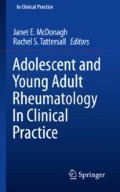Abstract
Paediatric and adult healthcare services approach adolescents and young adults (AYAs) differently. All rheumatology services should recognise AYAs as a distinct patient group with unique healthcare and psychosocial needs. AYAs require treatment within their wider psychosocial context, taking into account the life changes and transitions that shape this stage of development. Flexible, person-centred developmentally appropriate healthcare, peer support and knowledge and skills training are important for this group of individuals for whom feeling “normal” is of major importance.
Access this chapter
Tax calculation will be finalised at checkout
Purchases are for personal use only
References
World Health Organisation (WHO). 2015. Global standards for quality health care services for adolescents. http://www.who.int/maternal_child_adolescent/documents/global-standards-adolescent-care/en/. Accessed 30th Jan 2018.
Department of Health (DoH). 2011. Quality criteria for young people friendly health services. https://www.gov.uk/government/uploads/system/uploads/attachment_data/file/216350/dh_127632.pdf. Accessed 30th Jan 2018.
World Health Organisation (WHO). Towards adolescent-responsive health systems: steering the transition from adolescent-friendly projects to adolescent-responsive health systems. http://apps.who.int/adolescent/second-decade/section6/page8/sdolescent-responsiveness.html. Accessed 30th Jan 2018.
Ambresin AE, Bennett K, Patton GC, et al. Assessment of youth-friendly health care: a systematic review of indicators drawn from young people’s perspective. J Adolesc Health. 2013;52(6):670–81.
Farre A, Wood V, McDonagh J, et al. Health professionals’ and managers’ definitions of developmentally appropriate healthcare for young people: conceptual dimensions ad embedded controversies. Arch Dis Child. 2016;101(7):628–33.
Fay M, Lee MA. What young adults want from a young adult rheumatology service. Rheumatology. 2017;56(Supp 2):292. https://doi.org/10.1093/rheumatology/kex062.294
Northumbria Healthcare NHS Trust. Developmentally appropriate healthcare toolkit. https://www.northumbria.nhs.uk/quality-and-safety/clinical-trials/for-healthcare-professionals/. Accessed 30th Jan 2018.
Royal College of Physicians. Acute care toolkit 13: acute care for adolescents and young adults. https://www.rcplondon.ac.uk/guidelines-policy/acute-care-toolkit-13-acute-care-adolescents-and-young-adults. Accessed 30th Jan 2018.
Doukrou M, Segal TY. Fifteen-minute consultation: communicating with young people-how to use HEEADSSS, a psychosocial interview for adolescents. Arch Dis Child Educ Pract Ed. 2018;103(1):15–9.
YPHSIG App. https://app.appinstitute.com/heeadsss
Chadi N, Amaria K, Kaufman M. Expand your HEADS, follow the THRxEADS! Paediatr Child Health. 2017;22(1):23–5.
Michaud PA, Schrier L, Ross-Russel R, et al. Paediatric departments need to improve residents’ training in adolescent medicine and health: a position paper of the European Aacdemy of Paediatrics. Eur J Pediatr. 2018;177(4):479–87.
EULAR/PReS Online Course in Pediatric Rheumatology. https://www.eular.org/edu_online_course_paediatric.cfm. Accessed 30th Jan 2018.
EuTEACH. European training in effective adolescent care and health. https://www.unil.ch/euteach/en/home.html. Accessed 30th Jan 2018.
e-Learning for Healthcare. Adolescent Health Programme. https://www.e-lfh.org.uk/programmes/adolescent-health/. Accessed 30th Jan 2018.
Hart RI, McDonagh JE, Thompson B, Foster HE, Kay L, Myers A, Rapley T. Being as normal as possible: how young people ages 16-25 years evaluate the risks and benefits of treatment for inflammatory arthritis. Arthritis Care Res (Hoboken). 2016;68(9):1288–94.
Tong A, Jones J, Craig JC, Singh-Grewal D. Children’s experiences of living with juvenile idiopathic arthritis: a thematic synthesis of qualitative studies. Arthritis Care Res (Hoboken). 2012;64(9):1392–404.
Author information
Authors and Affiliations
Corresponding author
Editor information
Editors and Affiliations
Rights and permissions
Copyright information
© 2019 Springer Nature Switzerland AG
About this chapter
Cite this chapter
Lee, M., Jobling, K. (2019). Youth-Friendly Rheumatology Services. In: McDonagh, J., Tattersall, R. (eds) Adolescent and Young Adult Rheumatology In Clinical Practice. In Clinical Practice. Springer, Cham. https://doi.org/10.1007/978-3-319-95519-3_20
Download citation
DOI: https://doi.org/10.1007/978-3-319-95519-3_20
Published:
Publisher Name: Springer, Cham
Print ISBN: 978-3-319-95518-6
Online ISBN: 978-3-319-95519-3
eBook Packages: MedicineMedicine (R0)

